As of 2023, the web design industry revenue has already reached $40 billion globally. With 4.45 billion internet users and 1.58 billion active websites globally, businesses are continuously searching for new and improved web development technologies.
The ever-increasing eCommerce battle between businesses has been fueled by the onset of the pandemic. It is imperative for businesses to understand web development technologies to make well-informed online business decisions.
That’s why our web development experts came up with this comprehensive comparison between the best frontend development platforms: ReactJS and VueJS
This article goes into a detailed comparison between VueJS and ReactJS to answer frequently asked questions like:
- Is Vue better than React?
- Is Vue faster than React?
- What are the alternatives to React?
- Is React a framework?
- What are the main differences between Vue and React?
- What are the React and Vue pros and cons?
So without further ado, let’s begin!
Definition: React VS Vue
What is ReactJS?
A JavaScript Library for Building User Interfaces
Developed in 2013 by Jordan Walk from Facebook, ReactJS is an open-sourced JavaScript Library used for frontend development and building customizable and flexible web apps. The answer to the question “is React a framework?” is No, it is a JavaScript library. It follows a “learn once and write anywhere” format to create reusable UI components. ReactJS library delivers flexible and performance-oriented solutions with server-side rendering and it is best for developing highly interactive user interfaces.
React has an easy to understand and simple codebase, and it is maintained by Facebook and other developer communities. It is an effective JavaScript library for the rapid development of simple and complex web applications.
What is Vue Framework?
The Progressive JavaScript Framework
Vue framework is a flexible and lightweight JavaScript framework, ideal for creating progressive web UIs. Being one of the most popular alternatives to react, It offers efficient web tools for building futuristic single page web applications and frontend web apps. It is a very progressive and versatile JavaScript framework that enables you to make changes in the web app without affecting the core codebase. High decoupling abilities allows developers to deliver extended functionalities and customize components and modules with ease.
VueJS was developed in 2014 by Evan You, and it is supported and maintained by him and other active core team members. This JavaScript framework works efficiently with adequate updates without the financial support from big names like Facebook and Google.
Here’s an overall comparison video of Vue vs React by “James Q Quick”
Popularity: React VS Vue
Stack Overflow Data
We can study the Stack Overflow trends to determine which web development platform was most talked about or asked about in the last decade:

As you can see, ReactJS leads the race when it comes to sheer popularity. The popularity of Vue is stagnant after 2019, while React continues to grow without a hint of decline.
State of JavaScript Data
StateofJS provides an insight into the usage and future prospects of Vue and React.
In terms of usage:
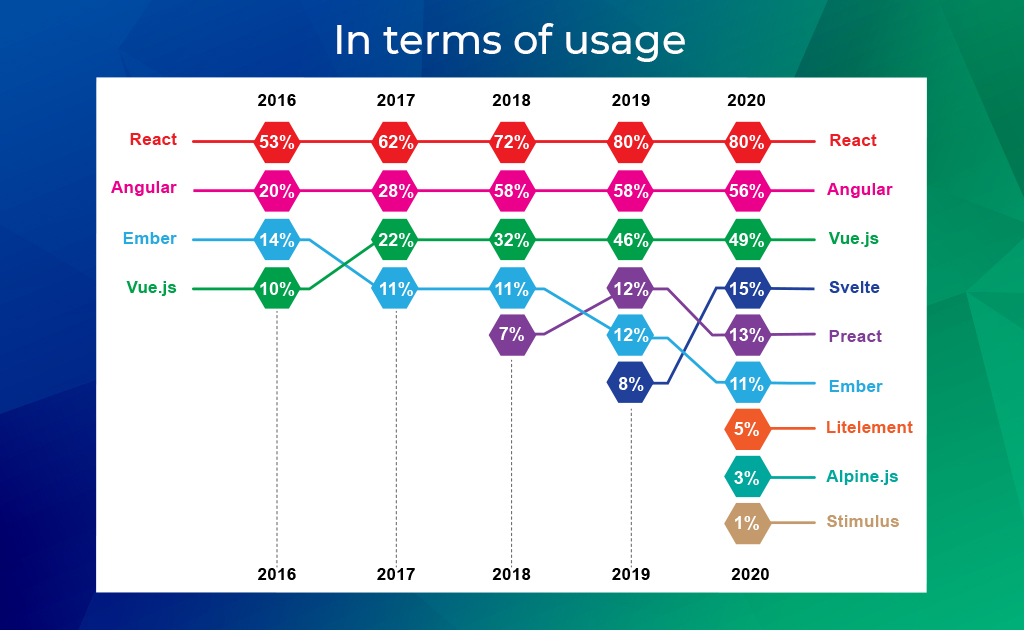
With 80% of web developers using ReactJS globally, it is the all-time leading web development platform in terms of usage. Vue follows closely behind angular with almost 50% of usage by web developers.
In terms of Interest:
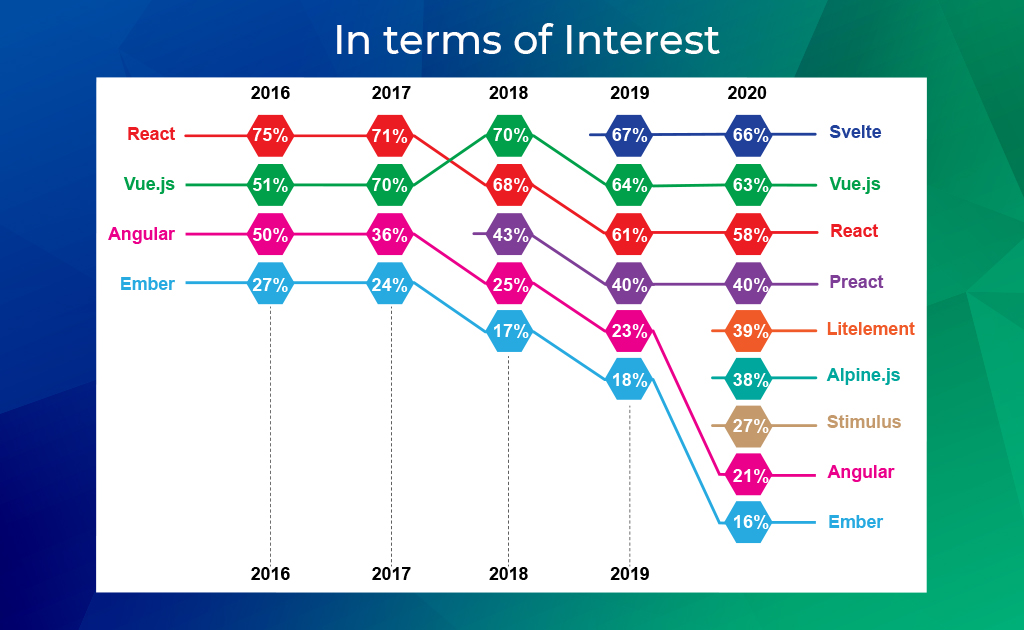
VueJS shows a promising level of interest among web developers globally, proving its future potential when compared to other frontend frameworks. In terms of sheer interest, React loses to Vue by a mere 5%.
SimilarTech&BuiltWith Data
SimilarTech data shows us the precise number of websites that utilise Vue and React and the total market share of these two web development platforms.
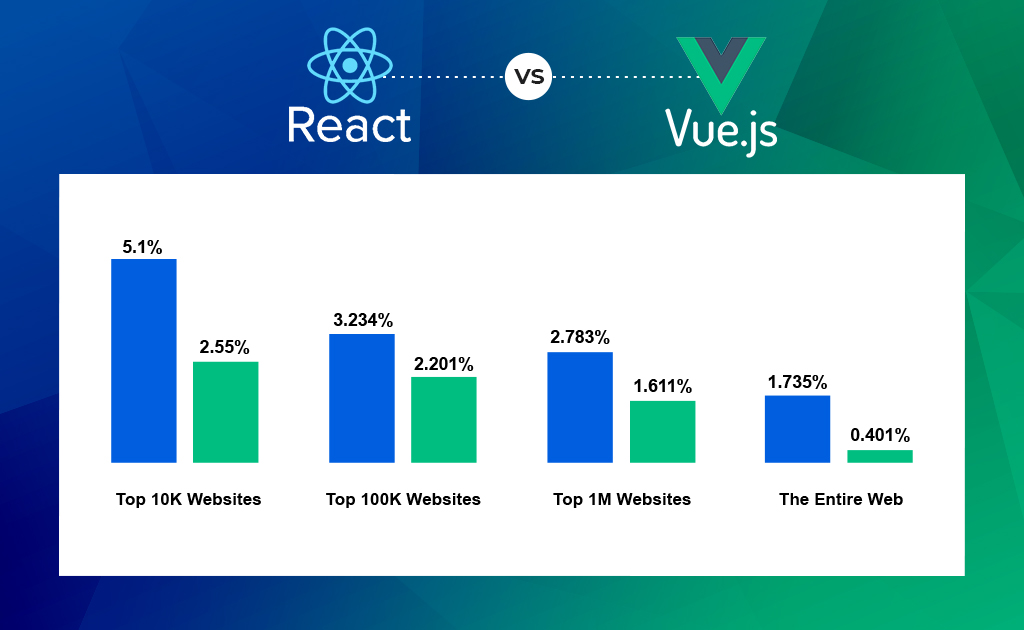
React leads every category of websites by leaps and bounds as already determined by the StateOfJS data. VueJS is slowly growing in popularity and shows great potential for the future.
According to the data from BuiltWith:
ReactJS is used by a total of 9.6 million websites globally
VueJS is used by a total of 1.6 million websites globally
Even though both of these platforms show an impressive number of total website usage around the world, ReactJS still wins the race of popularity in terms of usage.
Maturity: React VS Vue
The maturity of a web development platform plays a significant role. A platform that is not continuously regulated or maintained by a strong community tends to fail over time. Web developers always choose a well-matured web development platform because it gives them access to adequate libraries, tools, add-ons, etc. for a successful and efficient web development process.
The maturity of the platforms determines the strength of their community to deliver adequate and efficient updated features and tools. The web development platforms that have stood the test of time and shown effective results over the years are generally more preferred by web developers around the world.
Web development platforms’ maturity can be determined by the data from GitHub:
| Platform | GitHub Stars | GitHub Forks |
|---|---|---|
| React | 174k | 35k |
| Vue | 188k | 30k |
Above mentioned data shows that both React and Vue are well-matured web development platforms with adequate tools and community support. With similar numbers of GitHub stars and forks, React and Vue can be effectively used for web development with an ability to easily identify and remove bugs and problems with continuous updates and newer versions of the platforms.
Architecture: React VS Vue
ReactJS Architecture:
React is responsible for an application’s view layer constructed with reusable components. It does not have a specified architecture pattern like other frontend frameworks. The components in React modifies and renders the user interface according to the changes made on the clientside. This constant exchange of data between the client-side and the components keeps the website or web application running efficiently.
ReactJS is very efficient for building simple web apps with limited and pre-defined functionality. For developing highly complex web applications, React needs the support of external add-ons and libraries like MobX, Flux, Redux, Reflux, etc.
VueJS Architecture:
Vue has an MVVM (Model-View-ViewModel) architectural model for the effective development of large-scale or enterprise-grade web applications. It has a connected view and model part with a two-way data binding which looks like:
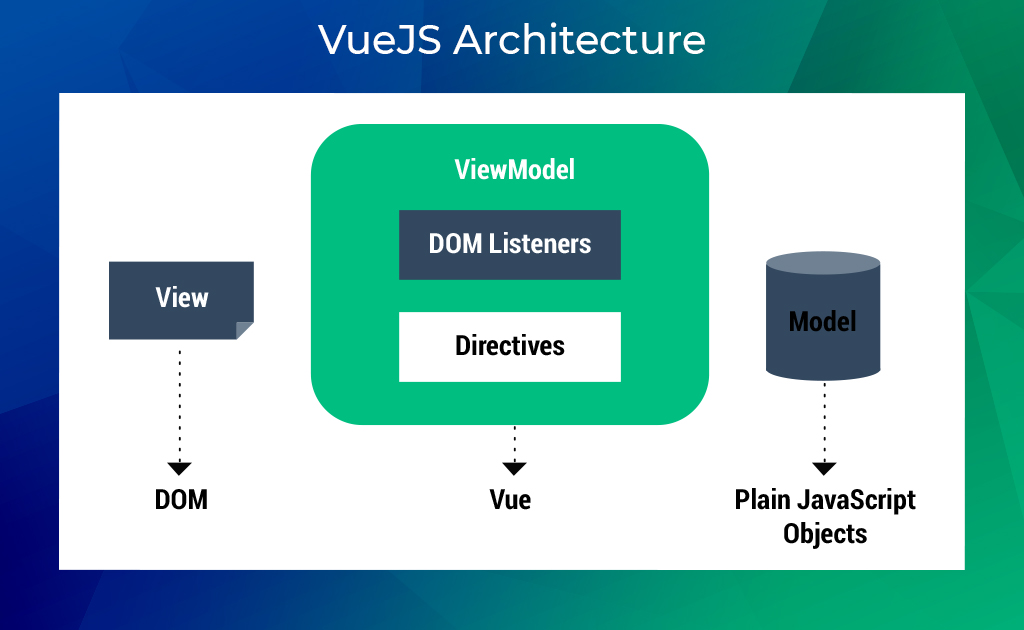
Model: A model object of JavaScript. The Model part is used to transform the data into reactive elements for building storage.
View: The View part manages the Document Object Model (DOM) which creates root elements to communicate with the needed DOM components.
ViewModel:The ViewModel part is responsible for the sync between the View and the Model part of the codebase. This is the part with which the developer interacts.
Before we explore further into the ReactJS and VueJS pros and cons, let’s look at the significant similarities between the two.
Similarities between Vue and React
The following are the common features between Vue and React:
- JavaScript-based web development platforms
- Utilises a Virtual DOM for rapid data rendering
- They have a single file structure that supports JSX
- They have components that allow Uni and Bi-directional flow of data
- They can be used to work with existing web applications
- A lightweight approach for rapid development speed
- Exhibit high-end performance, speed and flexibility
- They have vast communities to maintain and support the platforms with new updates
- They offer a wide selection of external libraries and tools
Advantages: React VS Vue
Being two of the most preferred web development platforms, they exhibit a wide range of benefits, let’s discuss the significant ones.
Pros of React:
- React can be used to build highly efficient web pages where the data is refreshed on the user interface instead of reloading the entire web page.
- High readability of code allows effective future optimization for optimum loading speed and user experience.
- React is a component-based JavaScript library with reusable components, accelerating development speed and making it easier to create complex functionalities.
- React delivers high performance with a virtual structure to refresh the required changes made on the real structure, resulting in faster load times, quick responses and a seamless user interface.
- Supported by Facebook, ReactJS has a strong and vast community support globally. This makes it easier for React developers to spot and eradicate bugs and get access to important external libraries and tools.
Pros of Vue:
- Vue is a progressive JavaScript framework that allows easy integration and migration by slowly applying the code during development, saving valuable development time.
- Vue framework utilises a conventional approach by using in-built solutions for building state support for animation and component management.
- Vue gets more and more lightweight and efficient with every new update. With a small-sized platform, developers can easily optimize the web application by focussing on adding features rather than repairing lines and debugging.
- With function-based API features, Vue enables functional extensions, making the components more readable and flexible for extending required functionalities.
- Web applications made with the Vue framework are future-proof because the need for regular updates and debugging is eliminated. A powerful production environment that makes it much easier to update and maintain.
Disadvantages: React VS Vue
In addition to the benefits, every web development platform has specific drawbacks, let’s look at the important cons of React and Vue.
Cons of React:
- React is susceptible to continuous updates and changes. React18 is currently underway and this ever-evolving environment makes it difficult for web developers to stay up-to-date with the ongoing version.
- React uses an extension syntax known as JSX, which combines JavaScript and HTML. It is a burden for React developers as the complexities of JSX makes it difficult for them to learn and use React efficiently.
- React focuses entirely on the View layer and requires additional frameworks or tools to execute other parts of the web application.
Cons of Vue:
- The community of Vue has a language barrier as it is most popular in China. The discussions and libraries of Vue are in Chinese, making it troublesome for web developers who speak different languages.
- The support system community for the Vue framework is still very young and needs time to grow. Novice developers may find it difficult to overcome issues while developing enterprise-grade web applications.
- The flexibility of a web development platform is desired in general, but too much flexibility can reverse that effect. This leads to over-complicated projects with an irregular and inefficient codebase.
- Vue framework’s ecosystem lacks external tools, making it difficult for developers to find adequate resources to finish projects.
Use Cases: React VS Vue
The best way to determine the best-suited web development platforms is by examining their specific use cases:
React Use Cases:
- Community-based websites like forums and marketplace
- Development of social media websites like social networks or dating websites
- High functioning and complex web applications
- Natively rendered mobile applications with React Native
- Platforms for multimedia content and video streaming
- Progressive web apps by integrating Ionic
Big names that use React:
- BBC
- PayPal
- Netflix
Vue Use Cases:
- Fast and lightweight web applications
- Web applications that require real-time communication with multiple users
- Websites or web apps to deliver content like magazines and blogs
- Single-page apps
- Progressive web apps
- Enterprise-grade applications
- Functionality extension for existing web applications
Big names that use Vue:
- Grammarly
- Gitlab
- Adobe Portfolio
- Behance
- Laravel Spark
Comparison: React VS Vue
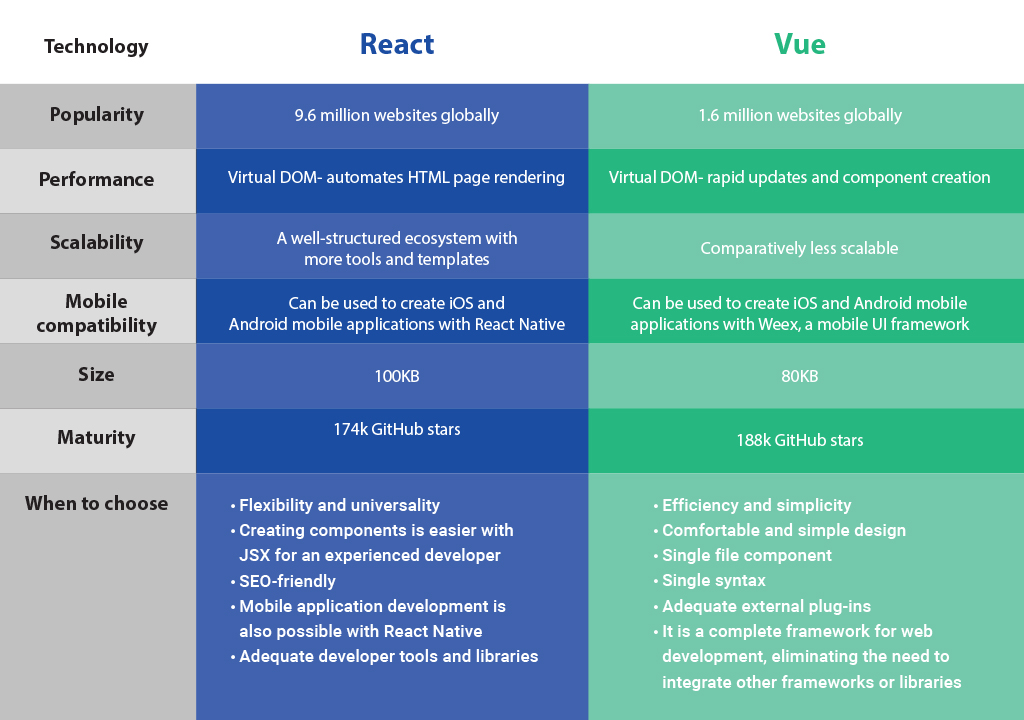
Conclusion
The varied range of differences between two web development platforms can be explained easily, but it is almost impossible to determine which one is better.
Leveraging the pros, cons and use cases to satisfy your specific web development needs is the best way to choose a framework or a library.
React has been the most popular frontend JavaScript library for years, but the Vue framework shows a lot of promise as a lightweight web development platform.
We hope this article has helped you in choosing the best web development platform for your web application or website.
If you require further assistance regarding web development, our experts are at your service.
With 16+ years of experience, Communication Crafts offers high skilled Vue and React developers to help your business flourish and prosper with ease.
Our web development services can provide websites and web applications that can captivate your existing audience and entice potential ones.
Building websites that create a difference.
Looking for bespoke web development solutions?
You demand, we deliver!
 Blog Communication Crafts
Blog Communication Crafts





